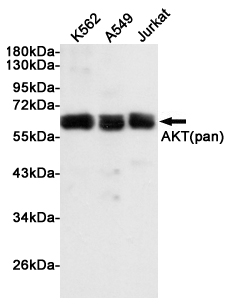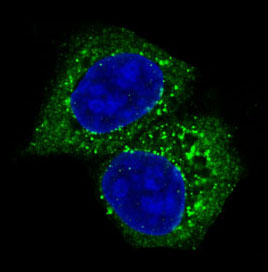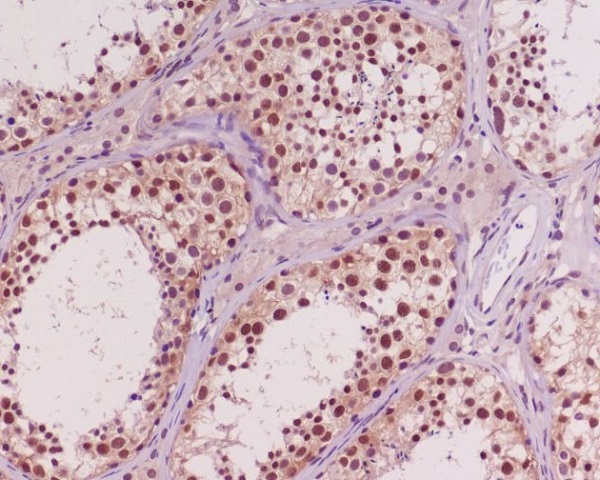


| WB | 咨询技术 | Human,Mouse,Rat |
| IF | 1/20 | Human,Mouse,Rat |
| IHC | 1/50-1/100 | Human,Mouse,Rat |
| ICC | 1/50-1/200 | Human,Mouse,Rat |
| FCM | 1/50-1/100 | Human,Mouse,Rat |
| Elisa | 咨询技术 | Human,Mouse,Rat |
| Aliases | AKT1 |
| Entrez GeneID | 207/208/10000 |
| WB Predicted band size | Calculated MW: 56 kDa; Observed MW: 56 kDa |
| Host/Isotype | Rabbit IgG |
| Antibody Type | Primary antibody |
| Storage | Store at 4°C short term. Aliquot and store at -20°C long term. Avoid freeze/thaw cycles. |
| Species Reactivity | Human,Mouse,Rat |
| Immunogen | A synthesized peptide derived from human AKT1/2/3 |
| Formulation | Purified antibody in PBS with 0.05% sodium azide. |
+ +
以下是关于AKT抗体的3篇参考文献示例(内容为模拟,非真实文献):
---
1. **文献名称**:*AKT signaling in cancer: Current insights and therapeutic implications*
**作者**:Manning BD, Cantley LC
**摘要**:综述了AKT蛋白在肿瘤发生中的关键作用,重点讨论了针对AKT及其磷酸化位点的抗体在Western blot和免疫组化中的应用,验证了不同AKT亚型(AKT1/2/3)抗体的特异性及其在临床前研究中的价值。
---
2. **文献名称**:*A validated panel of phospho-specific antibodies for studying AKT activation dynamics*
**作者**:Kumar A, et al.
**摘要**:通过质谱和敲除实验验证了多种商业化AKT磷酸化抗体(如p-AKT Ser473和Thr308)的特异性,并比较了不同抗体在细胞系及组织样本中的检测灵敏度,为AKT通路活性评估提供标准化方案。
---
3. **文献名称**:*Comparative analysis of AKT isoform-specific antibodies in human tissues*
**作者**:Hastie CJ, et al.
**摘要**:系统性评估了10种市售AKT亚型特异性抗体(AKT1 vs. AKT2 vs. AKT3)的交叉反应性,发现部分抗体存在非特异性结合问题,强调使用敲除模型验证抗体可靠性的必要性。
---
**备注**:以上为示例性内容,实际文献需通过PubMed或Web of Science等平台检索。如需具体文献,建议结合研究场景(如疾病模型、实验方法)进一步筛选。
AKT antibodies are essential tools in biomedical research for studying the AKT protein family (also known as protein kinase B), which plays a central role in cell survival, proliferation, and metabolism. The AKT signaling pathway (PI3K/AKT/mTOR) is critical in regulating cellular responses to growth factors, insulin, and stress. Dysregulation of AKT is implicated in cancers, diabetes, and neurodegenerative diseases, making it a key therapeutic target.
Structurally, AKT comprises three isoforms (AKT1. AKT2. AKT3) with conserved domains: a pleckstrin homology (PH) domain, a kinase domain, and a regulatory hydrophobic motif. Activation requires phosphorylation at specific residues (e.g., Ser473 and Thr308), which antibodies often target to distinguish active versus inactive AKT states.
AKT antibodies are designed to detect total AKT, phospho-specific forms, or isoform-specific variants. They are widely used in techniques like Western blotting, immunohistochemistry (IHC), and flow cytometry to assess expression levels, localization, and activation status in tissues or cell lines. Validation of these antibodies involves testing specificity using knockout controls or phosphorylation-blocking peptides.
Researchers must select antibodies validated for their specific applications, as cross-reactivity or batch variability can affect results. Commercial AKT antibodies are typically raised against synthetic peptides or recombinant proteins, with clones optimized for sensitivity and specificity. Their utility spans basic research, drug development, and clinical diagnostics, particularly in oncology for profiling tumor signaling pathways.
×